|
|
|
Sort Order |
|
|
|
Items / Page
|
|
|
|
|
|
|
| Srl | Item |
| 1 |
ID:
169334
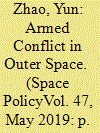

|
|
|
|
|
| Summary/Abstract |
Armed conflict in outer space could happen in two scenarios: first, a state may rely on relevant data obtained from the satellites to strengthen the effectiveness of its military action and second, a state may use either space-based or ground-based space weapons to attack a military target. Legally speaking, the above two scenarios constitute the use of force as defined in international law rules. From jurisprudential point of view, the extension of the right to self-defense to armed conflict in outer space provides a potential legitimate basis for the use of force in outer space, which is indirectly confirmed in the 1967 Outer Space Treaty. In view of the potentially serious consequences arising from armed conflicts in outer space, general principles and rules in international humanitarian law (including the limitation principle, the distinction principle, and the proportionality principle), together with the soft law rules and draft conventions arising from the ongoing regulatory efforts, shall provide a basic regulatory framework for armed conflict in outer space.
|
|
|
|
|
|
|
|
|
|
|
|
|
|
|
|
| 2 |
ID:
169336
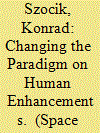

|
|
|
|
|
| Summary/Abstract |
Among the greatest obstacles to the implementation of crewed space missions are human biological limitations. Difficulties were always envisioned in relation to both Earth's moon and Mars but more so for Mars because long spaceflights would also expose crew to prolonged microgravity conditions, in addition to radiation. The result could well be osteoporosis, bone fractures, and disability. In this article, we do not contest the validity of bone loss studies. Rather, we question a seemingly tacit assumption about the immutability of human nature. Indeed, new, invasive, and noninvasive techniques of human enhancement already allow humans to enjoy modifications that will enable lengthy space missions. The alteration of human DNA has not only aided cancer patients but, for example, by using the CRISPR/Cas9 genome editing procedure, can also help to prevent damage to limbs and joints that a prolonged Mars mission could cause for the crew. Possible ethical objections to this solution are discussed, and trade-offs between risks and benefits outlined.
|
|
|
|
|
|
|
|
|
|
|
|
|
|
|
|
| 3 |
ID:
169328


|
|
|
|
|
| Summary/Abstract |
A fundamental requirement for space missions designed to touch “potential habitats” is the single number 10−4, the allowable probability of a single Earth organism contaminating the potential habitat. Many aspects of a mission that affect its complexity and cost—hardware design and manufacture, assembly and test, and mission operations—are driven by this value; therefore, it is important, on the threshold of an era of exploring ocean worlds, to have confidence in it. Yet, despite its long pedigree and occasional reviews, we find that the current requirement lacks programmatically defensible justification. At issue are three weaknesses: (1) microbial biology, in particular the science of extremophiles, is a rapidly changing field; (2) forward contamination (FC) is both a scientific and an ethical issue, yet no ethics-based conversation is apparent within policy-setting circles; and (3) because of these 2 factors, policy-setting cannot be static. We review the history of the requirement, how the evolving understanding of biology could drive it up or down, how the FC hazard relates to risk-management practice and to the ethics profession, and how a contemporary stakeholder conversation could adapt lessons already learned by other fields.
|
|
|
|
|
|
|
|
|
|
|
|
|
|
|
|
| 4 |
ID:
169332


|
|
|
|
|
| Summary/Abstract |
As it has accrued meaning over time, outer space has become as much a social construct as a physical reality. Because space is a product of the imagination, its contours are not stable and are subject to needs and desires that shift and evolve according to social, political, and economic priorities. This article examines differing relationships to space that shed light on the social and political dynamics that defined their historical moments—in particular the different iterations of the democratic impulse that these relationships express. This article compares the emergence of the dualistic and nation-based discourse of the late 1950s and 1960s Cold War era out of the first satellite and rocket launches to present-day ‘NewSpace,’ which is characterized by free enterprise and the logic of commodification. In the process, it touches on the 1986 by the Challenger mission and the emblematic figure of school teacher Christa McAuliffe; however, attention is paid primarily to how she represented a transitional moment between the global, nation-building priorities of the Cold War and the contemporary profit-driven individualism of NewSpace. The article concentrates on Cold War spaceflight and contemporary space tourism because they offer in the most vivid way a glimpse into how society's own projections have populated the universe.
|
|
|
|
|
|
|
|
|
|
|
|
|
|
|
|
| 5 |
ID:
169337
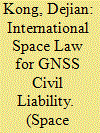

|
|
|
|
|
| Summary/Abstract |
GNSS-related activities qualify as ʻspace activities’, and it thus make international space law applicable. However, it is quite reticent to broadly interpret GNSS signals under the term ʻspace object’, due to the lack of material and physical properties. The discussions on whether GNSS damage qualifies as indirect damage, and whether the Liability Convention cover that indirect damage, are irrelevant to the applicability of GNSS damage to the outer space treaties. GNSS damage may apply Article VII of the Outer Space Treaty and the Liability Convention as long as the causal link between the damage and GNSS satellites (not GNSS signals) is unbroken, logical, foreseeable and not too remote under the sense of general international law.
|
|
|
|
|
|
|
|
|
|
|
|
|
|
|
|
| 6 |
ID:
169331


|
|
|
|
|
| Summary/Abstract |
Governmental investments on the development of high-tech clusters are among the main policies for socioeconomic development, enabling countries to be part of global value networks. Our objective is to identify which are the strategies of countries that want to join global aerospace value networks, by means of an abductive case research. Countries were divided in 3 groups (A; B; C) according to their global aerospace exports share. The analytical framework used to identify the strategies has 3 dimensions: network structure, network governance, and network dynamics. Results show different strategies according to the country's global exports share. While for countries in group A (exports above 1%), a strategy focused on the dimension network structure indicated a sustained high-tech sector. Countries in group C tend to focus on specialization, taking advantage of shifts in technological paradigms to upgrade their development level. The dimension network governance is mainly related to governmental efforts toward the creation of clusters and associations, promoting specialization and collaborative work. Finally, the dimension network dynamics describes the attraction of foreign companies to qualify the clusters at countries who belong to group C, while countries at group A reinforce their research and development activities. The comparison between countries is helpful for governmental representatives who want to develop strategies toward increasing participation in an industrial global value network and for supply chain managers to help selecting the locations for their operations.
|
|
|
|
|
|
|
|
|
|
|
|
|
|
|
|
| 7 |
ID:
169339


|
|
|
|
|
| Summary/Abstract |
Robert Lightfoot served as Acting Administrator of NASA a record-busting 15 months from January 2017 to April 2018. He led NASA through two budget cycles and coped with the tumultuous transition from President Obama to President Trump. Unusually for an Acting Administrator, he made a difference in policy. Not only did he help raise NASA's budget during his time in office, but he was central in two major decisions. One was the decision not to accelerate a crewed flight around the Moon and the other was the choice to make the Gateway project an official new start for NASA.
|
|
|
|
|
|
|
|
|
|
|
|
|
|
|
|
| 8 |
ID:
169329
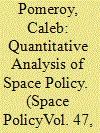

|
|
|
|
|
| Summary/Abstract |
Decades of space policy research have yielded an eclectic, multidisciplinary research agenda replete with findings that are relevant for theory and policy. Absent from the literature, however, is a systematic review and discussion of the data and research methods used to ascertain these findings. This is important for research progress because data and method choice have implications for the validity of the findings, potential contributions to theory, and efficacy of suggested policy prescriptions. Motivated by advances in computational social science, this article reviews the quantitative space policy literature and finds scope for further development with respect to data sources, method selection, and substantive topics of inquiry. Given these findings, two methodological areas are introduced, namely text and network analysis, and their utility is illustrated through an extension of a previous public opinion study, as well as a novel application regarding state support for international space law. This review might be relevant to scholars and practitioners interested in the empirical study of space policy.
|
|
|
|
|
|
|
|
|
|
|
|
|
|
|
|
| 9 |
ID:
169335
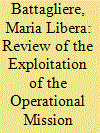

|
|
|
|
|
| Summary/Abstract |
Constellation of Small Satellites for Mediterranean Basin Observation COSMO-SkyMed (CSK) is one of the most advanced and powerful assets in the Earth observation field in which Italy plays a key role at world level. CSK has been designed for dual-use purposes to fulfill both civilian and defense needs, providing useful scientific and commercial applications and strategic monitoring. Since 2008, thanks to its features, the Italian Constellation is able to provide a strong contribution in several application domains such as Geo-hazard Risk Management (seismic events, volcano eruptions, landslides monitoring, and so forth), Ocean and Marine Applications, Land Cover and Vegetation, Polar Research, Cultural Heritage Monitoring, Water Resources and Hydrology. The focus of this article is to analyze the CSK data exploitation to monitor the trend over the last 4 years (2014-2017). Specifically, statistics have been provided based on different acquisition modes, application domains, and the geographic area of interest. The article also highlights the role of the CSK system in the context of international cooperation, focusing on the ongoing partnerships and agreements signed by the Italian Space Agency to facilitate CSK data exploitation.
|
|
|
|
|
|
|
|
|
|
|
|
|
|
|
|
|
|
|
|
|